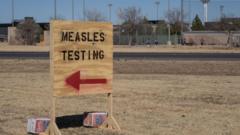The resurgence of measles in the United States, previously declared eliminated in 2000, has resulted in the tragic death of a second child in Texas amidst an ongoing outbreak. The school-aged girl, who was unvaccinated and otherwise healthy, succumbed to complications associated with the highly contagious virus while hospitalized. This incident marks the second death linked to the outbreak, which has seen over 480 cases reported in Texas as of Friday, a notable increase from earlier figures, with the broader U.S. count exceeding 600 cases this year. Notably, the current outbreak is largely linked to individuals who have not received vaccinations.
Public health officials, including Texas Health Secretary Robert F. Kennedy Jr., have faced scrutiny over their response to the outbreak. In the wake of the recent death, Kennedy visited Texas to express condolences and to assess the situation, reiterating the importance of vaccination in curbing the spread of measles. "This unfortunate event underscores the importance of vaccination," stated Aaron Davis, vice-president of UMC Health System, emphasizing that measles can lead to severe complications, particularly for unvaccinated individuals.
The outbreak's roots can be traced back to a religious community that historically rejects vaccinations, complicating local health officials' efforts to improve inoculation rates. Kennedy's approach has been criticized as initially too lenient; after the first reported death of an unvaccinated child, he altered his stance but stopped short of issuing a direct vaccination mandate, instead advising parents to consult with healthcare providers about vaccines. This prompted calls for stronger messaging from health experts, including Senator Bill Cassidy, who advocated for unequivocal endorsements of vaccination.
Compounding the issue, a recent increase in anti-vaccine sentiment has been cited as a factor in the resurgence of cases. Health authorities argue that achieving herd immunity, which protects vulnerable populations, requires at least 95% of the community to be vaccinated. The effectiveness of the MMR vaccine is well-documented, providing a 97% efficacy rate in preventing measles.
The implications of the outbreak extend beyond individual cases; they challenge public health systems and ignite debates about vaccination policies. Calls for action have surfaced from various quarters, with some labeling the current situation as a public health emergency. As vaccination rates falter, many question how best to counter misinformation about vaccines while ensuring that public health interventions are equitable and effective.
While President Donald Trump has publically downplayed the outbreak's severity, asserting it to be contained for now, the rising case counts and fatalities highlight the urgent need for a reassessment of public health strategies regarding infectious disease outbreaks in the age of rampant misinformation. Continued vigilance, public education, and vaccine advocacy remain crucial in addressing the challenges posed by this modern public health crisis.
Public health officials, including Texas Health Secretary Robert F. Kennedy Jr., have faced scrutiny over their response to the outbreak. In the wake of the recent death, Kennedy visited Texas to express condolences and to assess the situation, reiterating the importance of vaccination in curbing the spread of measles. "This unfortunate event underscores the importance of vaccination," stated Aaron Davis, vice-president of UMC Health System, emphasizing that measles can lead to severe complications, particularly for unvaccinated individuals.
The outbreak's roots can be traced back to a religious community that historically rejects vaccinations, complicating local health officials' efforts to improve inoculation rates. Kennedy's approach has been criticized as initially too lenient; after the first reported death of an unvaccinated child, he altered his stance but stopped short of issuing a direct vaccination mandate, instead advising parents to consult with healthcare providers about vaccines. This prompted calls for stronger messaging from health experts, including Senator Bill Cassidy, who advocated for unequivocal endorsements of vaccination.
Compounding the issue, a recent increase in anti-vaccine sentiment has been cited as a factor in the resurgence of cases. Health authorities argue that achieving herd immunity, which protects vulnerable populations, requires at least 95% of the community to be vaccinated. The effectiveness of the MMR vaccine is well-documented, providing a 97% efficacy rate in preventing measles.
The implications of the outbreak extend beyond individual cases; they challenge public health systems and ignite debates about vaccination policies. Calls for action have surfaced from various quarters, with some labeling the current situation as a public health emergency. As vaccination rates falter, many question how best to counter misinformation about vaccines while ensuring that public health interventions are equitable and effective.
While President Donald Trump has publically downplayed the outbreak's severity, asserting it to be contained for now, the rising case counts and fatalities highlight the urgent need for a reassessment of public health strategies regarding infectious disease outbreaks in the age of rampant misinformation. Continued vigilance, public education, and vaccine advocacy remain crucial in addressing the challenges posed by this modern public health crisis.




















